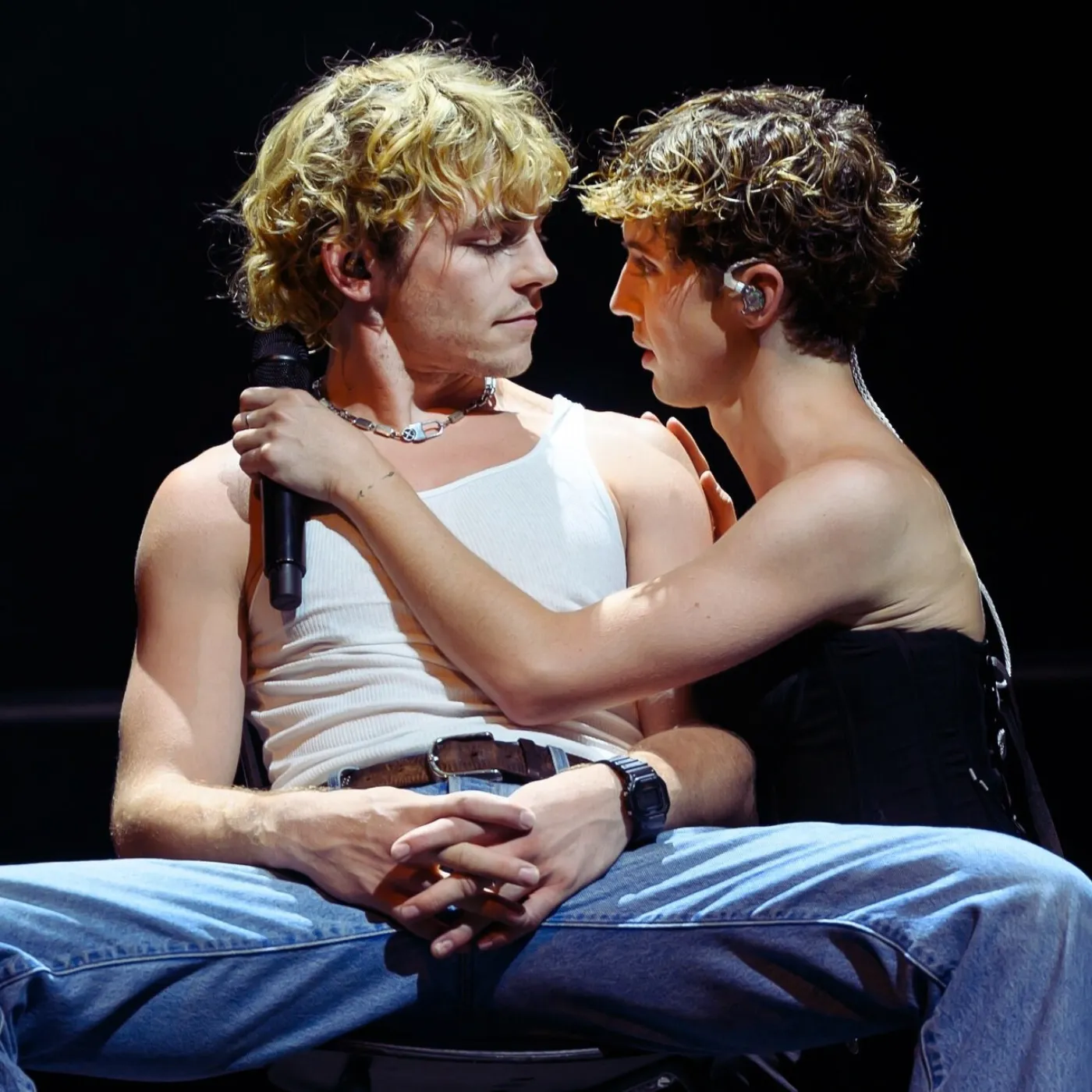

Ross Lynch Takes the London Stage with Troye Sivan in a Wild, Headline-Grabbing Showstopper
One year ago, London saw a moment that wasn’t supposed to feel carefully curated but did anyway. Ross Lynch stepped onto the stage with Troye Sivan for the live performance of “One Of Your Girls,” and the crowd went from polite hype to feral screaming in a heartbeat.

What made it so raw? The fact that it felt both spontaneous and calculated. One year later, people still argue about it. Not because it was the most technically flawless set—because it was the kind of spectacle that social media thrives on.
It was a moment designed for TikTok edits, Twitter threads, and Facebook headlines. Yet behind the perfectly timed lights and the social buzz was something grittier: two artists making sure nobody could look away.
And the aftershocks of that night say more about modern music culture than either artist might admit.
The Setup That Didn’t Feel Like Setup
The truth is, no live show of that scale happens without rehearsals, lighting cues, and backstage discussions. But the magic trick that night was making it seem casual.
Ross Lynch didn’t walk on stage with grand fanfare. He wasn’t introduced with spotlights blazing. He drifted in like it was no big deal—like two friends deciding, “Yeah, let’s do this.”
Except everything about it was big.
London crowds are famously discerning. But that night at the venue, the roar was instant. Camera phones flew into the air. Within seconds, Instagram stories were ablaze. People couldn’t believe what they were seeing.
Because Ross Lynch wasn’t just another support act or friend cameo. He was—and is—an artist with his own carefully managed brand. Watching him blend into someone else’s song, someone else’s show, felt strangely intimate.
The Internet Turned It Into Myth
Of course, no performance lives only on the stage anymore. If it’s not recorded, it “didn’t happen.” But in this case, the problem was the opposite: it was recorded too well.
Within hours, fans had posted multi-angle videos, close-up clips, and over-edited reels set to dramatic captions.
“This energy is unmatched.”
“They understood the assignment.”
“Nobody was doing it like them.”
You couldn’t scroll Facebook without seeing it pop up in reels. You couldn’t avoid the clips on TikTok, chopped and remixed to emphasize Ross’s casual smirk, Troye’s confident movement, and the barely-there nod they exchanged.
It became canon: the moment of the tour. Even people who hadn’t been following the show suddenly had an opinion.
Two Brands Colliding, Not Just Two Artists
Ross Lynch and Troye Sivan aren’t just musicians. They’re brands. Their images are as curated as their setlists.
Ross has the laid-back, playful confidence honed over years in music and screen.
Troye is the moody, precise performer who knows how to stage vulnerability.
So when they shared that stage in London, it wasn’t a duet—it was a collision. A merging of two finely tuned public personas designed to make people feel something.
And it worked.
Because that’s the point of these so-called “surprise” performances. They’re not random. They’re planned for maximum impact—for a social-media environment that rewards shock, exclusivity, and rewatchable drama.
But even knowing that, audiences lapped it up. Because it felt real enough.

The Anatomy of a Viral Moment
If you dissect that night, it checks every box for going viral:
Unexpected cameo
Easy to film and share
Obvious chemistry (real or staged, who cares?)
Room for interpretation and debate
Enough subtlety that it wasn’t too “try-hard”
That last point is key. Nothing tanks a live “moment” faster than looking too desperate for attention.
Troye and Ross managed to walk that tightrope perfectly. They acted like it was just another night. But the smirks, the body language, and the shared awareness of the crowd’s screams told another story.
It was viral bait.
A Year of Echoes
Twelve months later, people are still clipping and re-sharing the footage. It keeps popping up in “memories” on Facebook. It resurfaces in fan-made TikToks.
What does that say?
It says this wasn’t just a stunt. It was a blueprint for how to keep people talking when there’s nothing to promote.
Because let’s be honest: the music industry lives and dies on moments. Albums drop, tours finish, and singles fade from playlists. But a moment like that? It lives forever online.
Troye Sivan knows it. Ross Lynch knows it. Their teams know it.
It wasn’t an accident that it happened in London, one of the world’s most plugged-in, media-savvy cities. The crowd wasn’t just an audience—it was a marketing army with phones for weapons.
The Myth of “Unplanned”
When artists say “we just decided to do it,” you should hear “we planned it to look spontaneous.”
That London night was perfect theater.
Ross walked on stage with the studied nonchalance of someone who knows exactly how he’ll look on camera. Troye matched the vibe with just enough invitation in his eyes to make it look unrehearsed.
It was the kind of calculated chaos that modern audiences crave.
Because here’s the uncomfortable truth: people don’t want authenticity—they want performances of authenticity. They want moments that feel messy but are actually safe.
And that’s exactly what this was.
How Facebook Made It Bigger Than the Stage
It wasn’t just the live crowd that lost its mind. The real amplification happened on Facebook.
You know the type of post: “OMFG, did you see Ross join Troye in London???”
Thousands of comments arguing over whether it was planned. Shares with eye-roll emojis from people calling it cringe. Reactions ranged from heart emojis to furious rants about “manufactured hype.”
But every reaction, even hate, fed the algorithm.
Because nothing performs better on Facebook than divisive content.
The video spread because people wanted to fight about it. Was it a brilliant marketing move or an organic friendship moment? Did it prove Troye was a generous performer or just show how calculated these shows are?
Facebook doesn’t care what side you’re on. It cares that you’re arguing.
One Year Later: The Verdict Is Still Split
Ask people about it now, and you’ll get wildly different takes:
“It was genius. I’m obsessed with them on stage together.”
“It was so fake. Can’t believe people fell for it.”
“Iconic. They ate.”
“They tried way too hard.”
That’s the power of a good stunt: it refuses to die.
A year later, it’s still prime content for reels and posts. People reshare it not because they want to relive it, but because they want to re-argue it.
And for the artists, that’s better than applause. It’s longevity.
The Unwritten Rule of Modern Pop
In the age of social feeds and streaming charts, this is the new rule:
You don’t just perform for the room. You perform for the replay.
Troye Sivan understood it that night. Ross Lynch understood it. Their teams absolutely understood it.
You can be critical of it. You can call it fake. But you can’t deny it worked.
It was the moment everyone talked about the next morning, the clip that refused to die in your feed. And that’s the real currency of modern pop music—not just ticket sales or streams, but the memory that won’t go away.

The Legacy of That London Night
A year later, what remains?
A blueprint for other artists on how to design “spontaneity.”
A highlight reel that both artists still benefit from in terms of recognition and relevance.
A lesson about the power of social media to make a single night live forever.
It’s easy to be cynical. But it’s also impossible not to respect the execution.
They didn’t just play the song. They played the crowd.
And in an industry where forgetting is the enemy, they made sure no one could forget.
That’s not an accident.
That’s strategy.


















